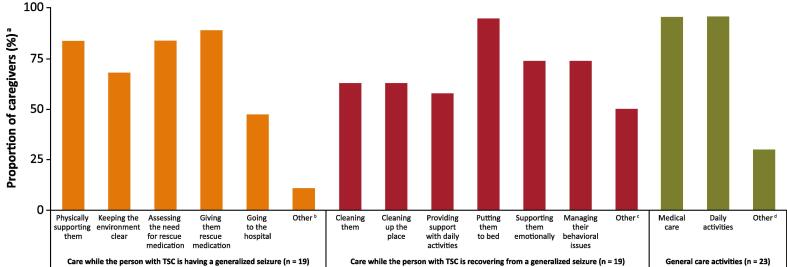Caregiver burden associated with caring for individuals with tuberous sclerosis complex-associated seizures: A descriptive, non-interventional survey in Sweden
IF 1.5
Q3 CLINICAL NEUROLOGY
引用次数: 0
Abstract
Tuberous sclerosis complex (TSC)-associated seizures result in a significant burden for caregivers. To quantify time spent and describe activities undertaken by caregivers of individuals with TSC-associated seizures in Sweden, primary caregivers participated in a cross-sectional, non-interventional online survey. Questions comprised patient/caregiver characteristics, care provision, time, and activities associated with generalized seizures or non-seizure-related care. Twenty-three primary caregivers participated; 96 % parents, 100 % female. Median number of caregivers per individual was three. In the last month, median (interquartile range [IQR]) hours for caregiving per week was 52.0 (25.7–100.0; n = 21); median (IQR) hours for non-seizure-related care was 46.7 (20.0–93.3; n = 21) and for generalized seizure-related care was 4.7 (1.7–15.8; n = 12). Beyond the last month, hours/week of generalized seizure-related care varied from 1.9 (0–8.8) to 14.0 (0.5–77.0). Professional/paid carers contributed 99.2 (73.5–127.5) hours/week of care. Non-seizure-related care activities included assisting with routine medical care (n = 22, 96 %) and daily activities (n = 22, 96 %). Activities relating to generalized seizures included assessing the need for (n = 16, 84 %) and giving (n = 17, 89 %) rescue medication, providing physical support (n = 16, 84 %), and clearing the individual’s environment during generalized seizures (n = 13, 68 %). During generalized seizure recovery, activities included taking the individual to bed (n = 18, 95 %), emotional support (n = 14, 74 %), and managing behavioral issues (n = 14, 74 %). In Sweden, despite contributions of paid caregivers, individuals with TSC-associated seizures require substantial time from unpaid primary caregivers, including seizure- and non-seizure-related care. Generalized seizures have a considerable impact on time spent caregiving and the care activities undertaken.

照顾者负担与照顾结节性硬化症相关癫痫患者相关:瑞典的一项描述性、非干预性调查。
结节性硬化症(TSC)相关的癫痫发作对护理人员造成重大负担。为了量化瑞典tsc相关癫痫患者的护理人员所花费的时间并描述其所从事的活动,主要护理人员参与了一项横断面、非介入性在线调查。问题包括患者/护理人员的特征、护理提供、时间和与全身性癫痫发作或非癫痫相关护理相关的活动。23名主要护理人员参与;96%是父母,100%是女性。每个人照顾者的中位数是三个。上个月,每周护理时间的中位数(四分位数间距[IQR])为52.0小时(25.7-100.0;n = 21);非癫痫相关护理的中位数(IQR)小时为46.7 (20.0-93.3;N = 21),而与癫痫相关的全面护理为4.7 (1.7-15.8;n = 12)。在过去一个月之后,与癫痫相关的全面性护理小时数/周从1.9(0-8.8)到14.0(0.5-77.0)不等。专业/付费护理人员每周提供99.2(73.5-127.5)小时的护理。非癫痫相关护理活动包括协助常规医疗护理(n = 22,96 %)和日常活动(n = 22,96 %)。与全身性癫痫发作相关的活动包括评估(n = 16, 84%)和给予(n = 17, 89%)抢救药物的需要,提供身体支持(n = 16, 84%),以及在全身性癫痫发作期间清理个体环境(n = 13, 68%)。在癫痫全面恢复期间,活动包括将患者带到床上(n = 18, 95%)、情感支持(n = 14, 74%)和管理行为问题(n = 14, 74%)。在瑞典,尽管有偿护理人员做出了贡献,但与tsc相关的癫痫发作患者需要从无偿的初级护理人员那里获得大量时间,包括癫痫发作和非癫痫发作相关的护理。全身性癫痫发作对护理时间和护理活动有相当大的影响。
本文章由计算机程序翻译,如有差异,请以英文原文为准。
求助全文
约1分钟内获得全文
求助全文
来源期刊

Epilepsy and Behavior Reports
Medicine-Neurology (clinical)
CiteScore
2.70
自引率
13.30%
发文量
54
审稿时长
50 days
 求助内容:
求助内容: 应助结果提醒方式:
应助结果提醒方式:


